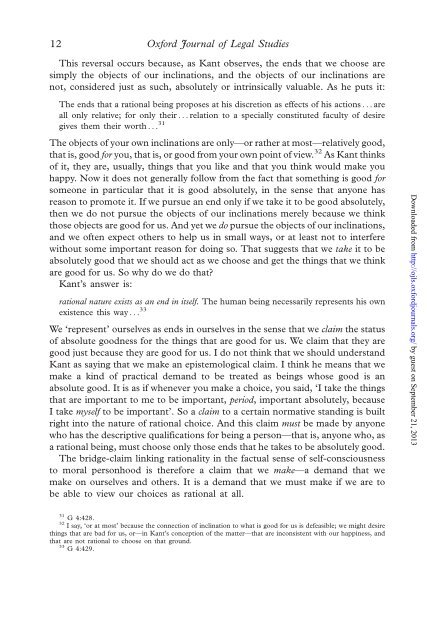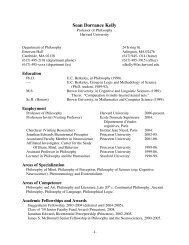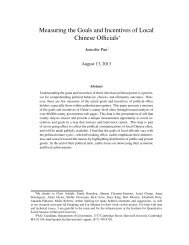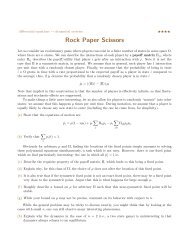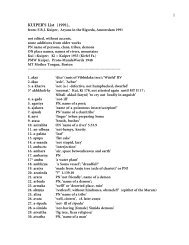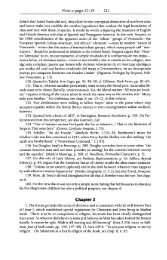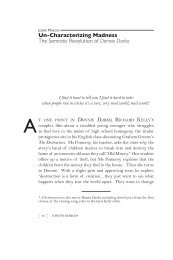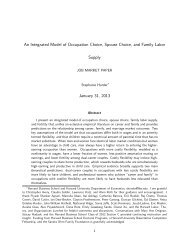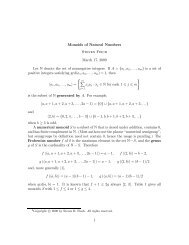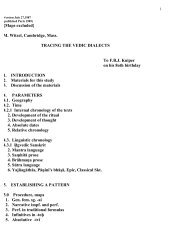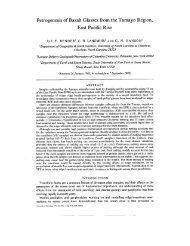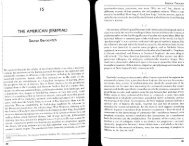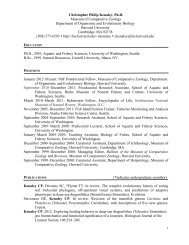Kantian Ethics, Animals, and the Law - People.fas.harvard.edu
Kantian Ethics, Animals, and the Law - People.fas.harvard.edu
Kantian Ethics, Animals, and the Law - People.fas.harvard.edu
You also want an ePaper? Increase the reach of your titles
YUMPU automatically turns print PDFs into web optimized ePapers that Google loves.
12 Oxford Journal of Legal Studies<br />
This reversal occurs because, as Kant observes, <strong>the</strong> ends that we choose are<br />
simply <strong>the</strong> objects of our inclinations, <strong>and</strong> <strong>the</strong> objects of our inclinations are<br />
not, considered just as such, absolutely or intrinsically valuable. As he puts it:<br />
The ends that a rational being proposes at his discretion as effects of his actions ...are<br />
all only relative; for only <strong>the</strong>ir ...relation to a specially constituted faculty of desire<br />
gives <strong>the</strong>m <strong>the</strong>ir worth ... 31<br />
The objects of your own inclinations are only—or ra<strong>the</strong>r at most—relatively good,<br />
that is, good for you, that is, or good from your own point of view. 32 As Kant thinks<br />
of it, <strong>the</strong>y are, usually, things that you like <strong>and</strong> that you think would make you<br />
happy. Now it does not generally follow from <strong>the</strong> fact that something is good for<br />
someone in particular that it is good absolutely, in <strong>the</strong> sense that anyone has<br />
reason to promote it. If we pursue an end only if we take it to be good absolutely,<br />
<strong>the</strong>n we do not pursue <strong>the</strong> objects of our inclinations merely because we think<br />
those objects are good for us. And yet we do pursue <strong>the</strong> objects of our inclinations,<br />
<strong>and</strong> we often expect o<strong>the</strong>rs to help us in small ways, or at least not to interfere<br />
without some important reason for doing so. That suggests that we take it to be<br />
absolutely good that we should act as we choose <strong>and</strong> get <strong>the</strong> things that we think<br />
are good for us. So why do we do that?<br />
Kant’s answer is:<br />
rational nature exists as an end in itself. The human being necessarily represents his own<br />
existence this way ... 33<br />
We ‘represent’ ourselves as ends in ourselves in <strong>the</strong> sense that we claim <strong>the</strong> status<br />
of absolute goodness for <strong>the</strong> things that are good for us. We claim that <strong>the</strong>y are<br />
good just because <strong>the</strong>y are good for us. I do not think that we should underst<strong>and</strong><br />
Kant as saying that we make an epistemological claim. I think he means that we<br />
make a kind of practical dem<strong>and</strong> to be treated as beings whose good is an<br />
absolute good. It is as if whenever you make a choice, you said, ‘I take <strong>the</strong> things<br />
that are important to me to be important, period, important absolutely, because<br />
I take myself to be important’. So a claim to a certain normative st<strong>and</strong>ing is built<br />
right into <strong>the</strong> nature of rational choice. And this claim must be made by anyone<br />
who has <strong>the</strong> descriptive qualifications for being a person—that is, anyone who, as<br />
a rational being, must choose only those ends that he takes to be absolutely good.<br />
The bridge-claim linking rationality in <strong>the</strong> factual sense of self-consciousness<br />
to moral personhood is <strong>the</strong>refore a claim that we make—a dem<strong>and</strong> that we<br />
make on ourselves <strong>and</strong> o<strong>the</strong>rs. It is a dem<strong>and</strong> that we must make if we are to<br />
be able to view our choices as rational at all.<br />
Downloaded from http://ojls.oxfordjournals.org/ by guest on September 21, 2013<br />
31 G 4:428.<br />
32 I say, ‘or at most’ because <strong>the</strong> connection of inclination to what is good for us is defeasible; we might desire<br />
things that are bad for us, or—in Kant’s conception of <strong>the</strong> matter—that are inconsistent with our happiness, <strong>and</strong><br />
that are not rational to choose on that ground.<br />
33 G 4:429.


